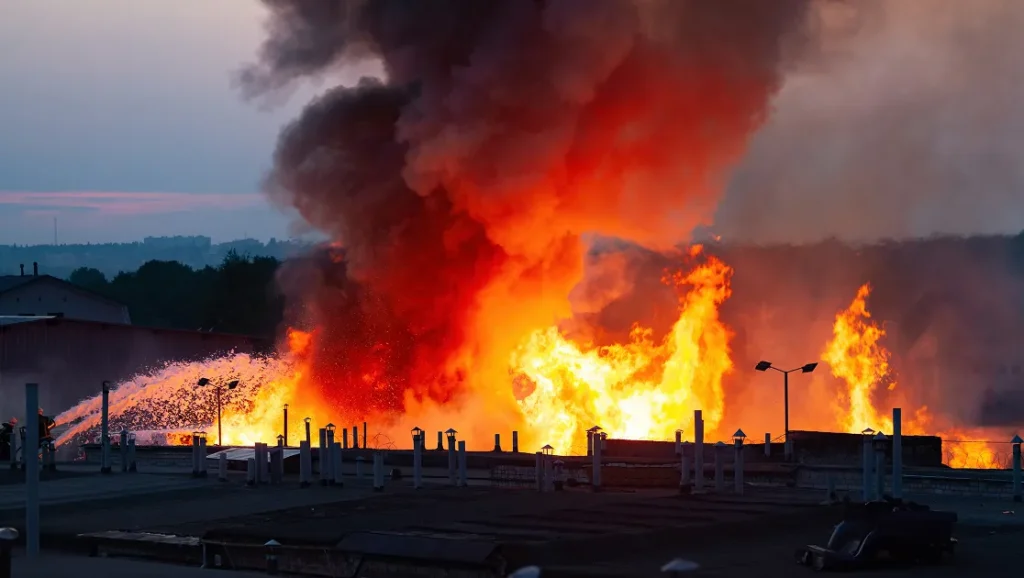Virginia is home to tens of thousands of industrial plant and manufacturing workers, many of whom face risks from explosions that can cause serious injuries or death. Explosions at chemical plants and industrial sites happen for different reasons, including:
- Chemical Explosions: These occur because of rapid chemical reactions, such as gas leaks, mixing volatile substances, or use of explosives like dynamite.
- Mechanical Explosions: Caused by pressure buildup inside equipment, such as boiler explosions or tank ruptures.
- Nuclear Explosions: These release immense energy from nuclear fission or fusion, though rare at chemical and industrial plants.
At Breit Biniazan, we represent both workers injured on the job and civilians harmed by nearby industrial explosions. Our experienced attorneys understand the complex causes behind these disasters and fight to help victims secure compensation for their injuries and losses.
Our Established Track Record of Success
We have a strong history of winning cases involving a wide range of explosion-related incidents, including:
- Industrial plant explosions
- Refinery blasts
- Gas line and gas can explosions
- Pipeline accidents
- Oil rig explosions
- Chemical plant disasters
- Fires and other explosion-related emergencies
Having an experienced explosion injury lawyer is needed to navigate these catastrophic events. We fight aggressively for life-changing settlements on behalf of our clients.
How & Why Chemical Plant Explosions Happen
Chemical plant explosions are often caused by a mix of unsafe conditions, human error, and equipment failure. Common causes include:
- Combustible Dust: Fine dust particles can accumulate and ignite, causing powerful explosions.
- Flammable Gases and Liquids: Leaks or improper handling of dangerous chemicals can trigger blasts.
- Electrical Hazards: Faulty wiring, short circuits, or ungrounded equipment may create sparks that ignite chemicals.
- Hot Work: Activities like welding or cutting can create ignition sources if not safely managed.
- Defective Machinery and Equipment: Poorly maintained or aging equipment is prone to malfunction, raising explosion risks.
Unsafe Chemical Storage
Improper storage of chemicals is one of the most common causes of chemical plant explosions. When chemicals are stored incorrectly or mixed in unsafe combinations, they can create unstable conditions that increase the risk of leaks, spills, and dangerous reactions. Handling chemicals without following strict safety rules or failing to use proper containers can lead to volatile substances igniting or exploding unexpectedly. Ensuring safe chemical storage is essential to prevent catastrophic accidents and protect both workers and nearby communities.
Poor Equipment Maintenance and/or Aging Structures
Equipment that is old, broken, or not regularly inspected can fail suddenly and cause explosions. Chemical plants rely heavily on machinery that must be maintained carefully to operate safely. If maintenance is neglected, equipment can malfunction or break down, leading to leaks, sparks, or pressure build-up that may trigger deadly blasts. Aging structures, combined with poor upkeep, significantly increase the chances of accidents that could otherwise be avoided with proper care.
Failure to Follow OSHA Safety Protocols
Failing to comply with OSHA (Occupational Safety and Health Administration) safety standards creates dangerous work environments in chemical plants. When companies ignore regulations, such as proper worker training, adequate safety gear, or regular safety checks, they put employees at high risk of injury or death. Inadequate personal protective equipment (PPE) and unsafe work procedures leave workers vulnerable to fires, explosions, and chemical exposures that could be prevented with strict adherence to safety protocols.
Human Error and Insufficient Training
Many chemical plant accidents occur because employees are not properly trained to handle hazardous materials or emergency situations. Lack of thorough safety training leads to mistakes, such as improper chemical handling, ignoring warning signs, or incorrect operation of equipment. In addition, poor supervision and oversight contribute to accidents that might have been avoided if workers were educated about risks and safe practices. Employers are responsible for ensuring their workers have the necessary knowledge and resources to work safely.
Dire Consequences of Chemical Plant Explosions
- Severe Burns: Explosions often cause serious burns ranging from first to fourth degree, including flame burns and chemical burns.
- Chemical Exposure: Exposure to harmful chemicals released during explosions increases risks of long-term health problems such as cancer, lung disease, and heart complications.
- Long-Term Disability or Disfigurement: Survivors may suffer broken bones, lung damage from inhaling smoke or toxins, spinal injuries, internal bleeding, hearing loss, blunt trauma from debris, skin penetration injuries, blast lung (lung trauma from pressure waves), ruptured eyes or eardrums, traumatic brain injuries (TBI), crush injuries, amputations, and permanent scars or disfigurement.
- Psychological Trauma and PTSD: Experiencing or witnessing an explosion can cause severe emotional distress and post-traumatic stress disorder, leading to anxiety, flashbacks, and other mental health issues.
Legal Considerations for Victims of Chemical Explosions
Victims can seek compensation for various damages including medical expenses, lost income, pain and suffering, and in some cases exemplary (punitive) damages meant to punish wrongful conduct. Virginia law sets a statute of limitations of 2 years from the date of injury or from when one should reasonably have known about harm (discovery rule applies if diseases develop years later).
Workers’ Compensation vs. Third-Party Claims
If injured at work, you will likely file a workers’ compensation claim through your employer’s insurance. Workers’ comp covers medical bills, part of lost wages, and disability, regardless of fault. Workers’ comp claims can be complicated; employers sometimes resist fair payments, so legal help is often needed.
If the explosion was caused by a third party (e.g., subcontractor, equipment manufacturer), you might file a personal injury claim against them in addition to or instead of workers’ comp.
For community members harmed by chemical plant explosions, third-party personal injury claims are the primary option. Liability depends on facts and often involves the plant owner or equipment manufacturers.
Wrongful Death Lawsuits
If a loved one suffers fatal injuries from a chemical plant explosion, you may be able to file a wrongful death suit to seek compensation for funeral costs, lost support, and emotional suffering. While nothing replaces a lost family member, these claims offer financial help and hold responsible parties accountable.
In Virginia, wrongful death actions must be filed by the deceased person’s personal representative—usually the executor or administrator of the estate—within two years from the date of death. This statute of limitations can sometimes be extended under the "discovery rule" if the injury or death occurred but was not reasonably discovered until later.
How Liability is Determined
Virginia’s strict contributory negligence law means if you contributed even slightly to the accident, you may be barred from recovering damages. That’s why early legal help is crucial.
Liability can fall on:
- Chemical plant owners or operators
- Equipment manufacturers
- Third-party contractors or maintenance crews
Proving Negligence
To prove fault, attorneys investigate whether:
- The plant stored and handled chemicals safely
- Safety procedures were adequate and followed
- Equipment was properly maintained and operated
- Response plans were in place for emergencies
Why Breit Biniazan is the Right Firm for You
With Breit Biniazan fighting on your side, you gain experienced attorneys who will aggressively pursue the justice and financial recovery you deserve. We handle every case with personalized attention and keep you updated every step of the way. Our skilled explosion lawyers have experience with:
- Plant explosions from equipment failure or chemical leaks
- Refinery accidents caused by gas leaks or human error
- Gas explosions involving utility lines or containers
- Pipeline explosions due to poor maintenance or construction defects
- Oil rig explosions when equipment fails or negligence occurs
- Chemical plant explosions causing burns, toxic exposure, and other injuries
- Fires linked to explosions or defective products
No matter the explosion type, we have the knowledge and resources to pursue your claim.
Reputation for Winning Complex & High-Stakes Claims
Breit Biniazan is known for successfully handling complicated, high-value explosion injury cases, fighting hard to maximize client recoveries.
Dedication to Personalized Attention
We treat every client with care and provide clear communication at every step. Your case matters and we listen closely to your needs.
Contact our Personal Injury Attorneys Today
If you or a loved one has been injured in a chemical plant explosion or related industrial disaster, don’t wait to get the legal support you need. At Breit Biniazan, we understand how overwhelming these accidents can be—physically, emotionally, and financially. Our dedicated team is here to listen carefully to your story and answer all your questions.
We offer a free, no-obligation consultation where we will thoroughly review the details of your case and explain your legal rights in simple terms. We’ll help you understand the types of compensation you may be entitled to and the best way to pursue your claim.
Call Breit Biniazan now – your trusted partners in chemical plant explosion injury cases.















